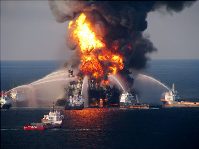Transocean accused of improper training, subpar maintenance in Gulf spill
 By TOM FOWLER
By TOM FOWLER
NEW ORLEANS -- Transocean failed to train its drilling rig crews properly and didn't maintain key safety equipment on the doomed Deepwater Horizon drilling rig, leading to the deadly 2010 explosion and oil spill, a lawyer representing Gulf Coast businesses said.
During opening statements of a trial over liability, Jim Roy, a lawyer for companies suing BP, Transocean, Halliburton and others, cited a string of prior incidents in Federal District Court that he said showed the rig owner was grossly negligent leading up to the accident.
Information about close calls on other rigs wasn't passed along, Mr. Roy said, adding that just a month before the April 2010 accident, the Transocean crew on the Deepwater Horizon failed to catch a sudden surge of natural gas from the well they were drilling, indicating the company had "a chronic problem."
Mr. Roy was the first lawyer to make an opening statement on the first day of the civil trial aimed at determining the degree of culpability BP and the other companies have for the disaster, which killed 11 workers and unleashed the worst offshore oil spill in US history.
A second trial, scheduled for the fall, will determine how much oil leaked into the Gulf of Mexico. Together, these cases will determine the size of fines companies face under the Clean Water Act, which could range as high as $17.6 billion.
BP, which hired Transocean and Halliburton to work on drilling its deep-water oil well, has argued the fines would likely be less than $5 billion. The company will get 90 minutes to put on its opening statement Monday afternoon.
Transocean, which presented its opening statement Monday morning, rebutted the claims against the company's rigs and its crews. The Coast Guard, federal safety regulators and BP's own management considered the Deepwater Horizon drilling rig "what 'good' looked like," said Brad Brian, a lawyer for Transocean. He outlined details of Transocean's safety systems, and emphasized that BP had primary responsibility for the design of the well and for final safety decisions.
"BP took a series of unconscionable risks with what it knew was an exceptionally dangerous well," Mr. Brian said.
Mr. Brian focused on a 10 minute ship-to-shore phone call between two BP engineers, Mark Hafle and Donald Vidrine, less than an hour before the explosion. Mr. Vidrine allegedly talked about odd results from a key safety test, results that Mr. Hafle noted didn't seem to be appropriate.
"In many ways, it's a microcosm of what BP did wrong on this well and why Transocean and its crew truly are victims of BP's misconduct," Mr. Brian said. Instructing the crew to go ahead with its work in the wake of these test results "was reckless, in utter and wholesale disregard of the facts."
Michael Underhill, the Justice Department's lead civil attorney in the case, also focused on that conversation as one of several places where the accident could have been prevented.
"That conversation we will show should have prevented the tragedy, the need for any of us to be in this courtroom today and for the next 3 months," Mr. Underhill said. "They had a conversation that could have saved eleven lives, saved the Gulf, saved the people of the Gulf from a catastrophe."
The government plans to "show that a long series of missteps and reckless decisions by BP taken together demonstrate willful misconduct," he said. "We will show that individual decisions made by BP standing alone constitute gross negligence."
BP has already agreed to pay more than $30 billion in fines, settlements and cleanup costs for the well blowout and the resulting Gulf of Mexico oil spill, including $4 billion to settle criminal charges related to the accident. Transocean has agreed to $1 billion in civil fines and $400 million in criminal penalties.
Witness testimony is expected to begin on the Tuesday, starting with Robert Bea, a professor of civil and environmental engineering from the University of California, Berkeley. He will likely be followed by Lamar McKay, chairman and president of BP Americas. A previously taped questioning of former BP chairman, Tony Hayward, will be played Tuesday.
Despite the start of the trial, settlement discussions are continuing, according to people familiar with the matter. The Justice Department and Gulf Coast states have considered offering BP a deal under which the company would pay $16 billion to settle civil claims.
The settlement offer would cover potential fines owed by BP under the Clean Water Act, and payments under an environmental evaluation known as the Natural Resources Damage Assessment, these people said.
Dow Jones Newswires






Comments